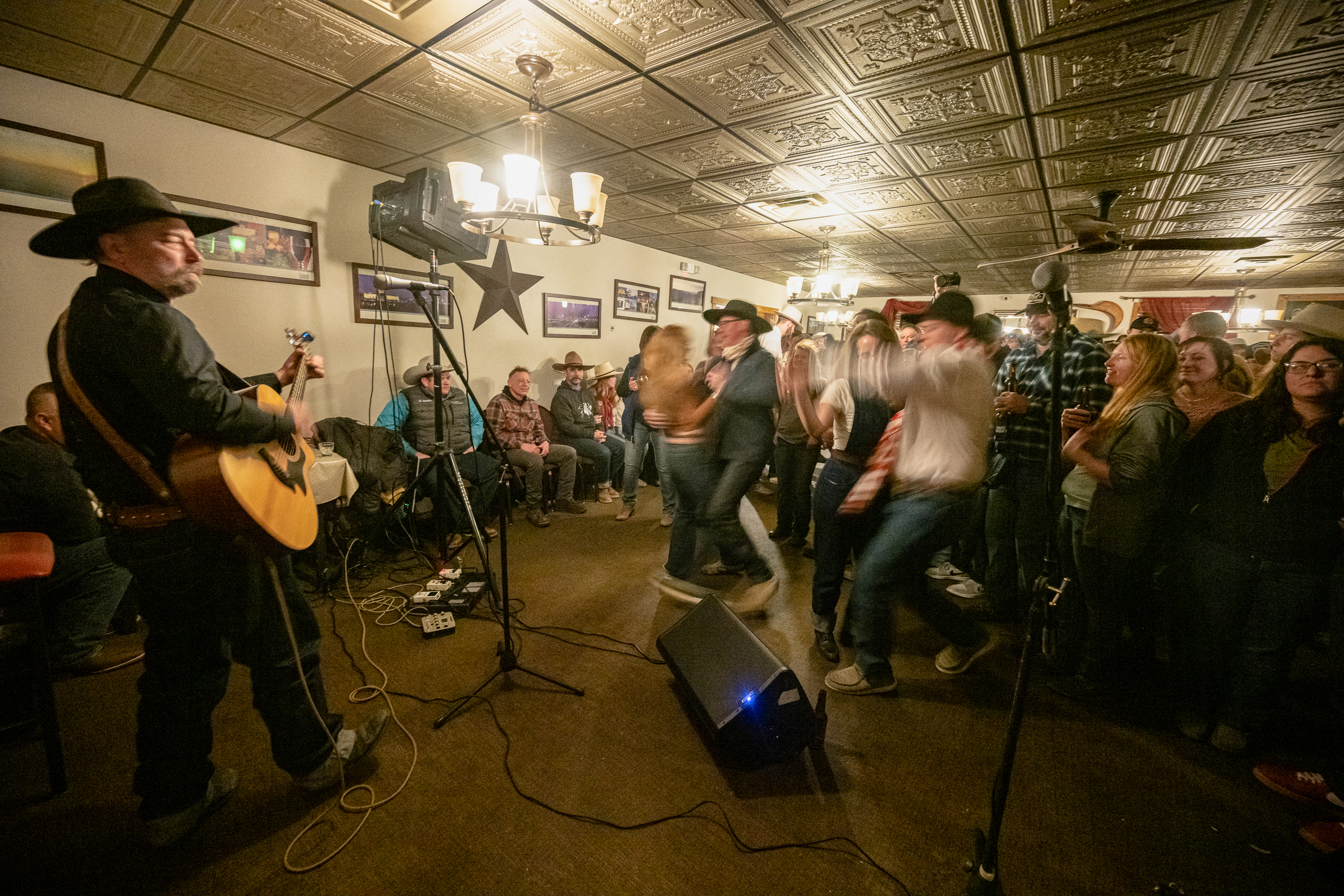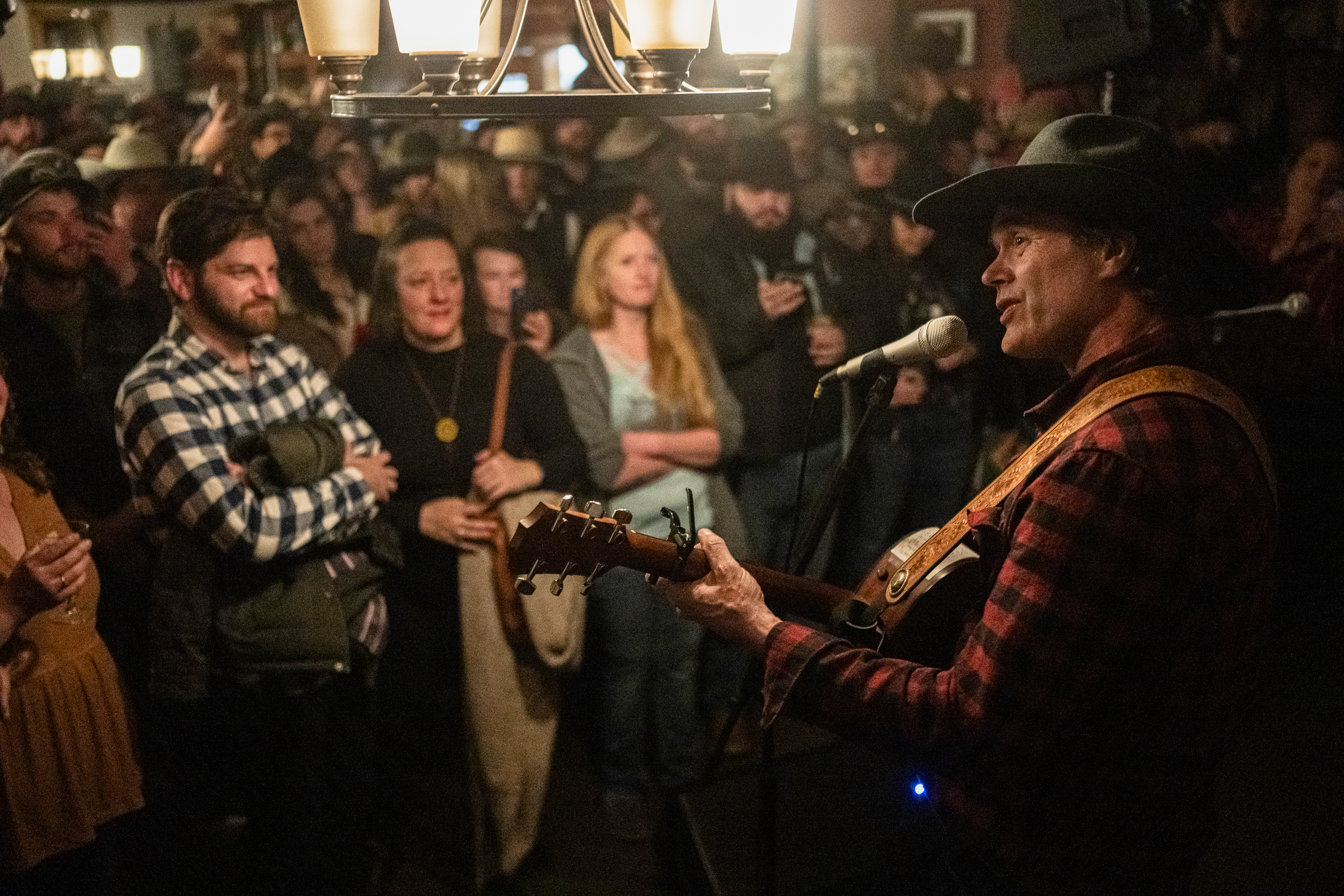Is it cowboy poetry if it’s not written by a cowboy?

When Justin Reichert was 18, he caught a ride with a friend from his family’s farm in McPherson, Kansas, to Elko, Nevada, 1,200 miles away. It was 1992, the seventh year of Elko’s National Cowboy Poetry Gathering, a series of readings and musical performances created to celebrate all the Westerners whose lives revolve around raising cattle.
Reichert had never been to the event, which its fans call, simply, “the gathering,” but he’d heard a lot about it. The son of a horse trader — a rodeo competitor who could ride, he said, “anything with hair” — he wanted out of Kansas. He wanted to live and work as a cowboy out West.
Reichert arrived in Elko, a cow town in the sagebrush flats at the foot of the snow-capped Ruby Mountains, with $10 in his pocket and a “book of shitty poetry” to read at the gathering’s open mic events.
“It was electric,” he said.
He went to the Commercial Casino, where bartenders slipped him alcohol despite his age, and he sneaked into the Stockmen’s Casino, where a hundred people at any given time would splinter into small groups to jam and sing and dance. The gathering made such an impression on him that he returned to Kansas and packed his bags. He moved to Idaho, where he apprenticed with a guy who made leather chaps and drifted between ranch jobs in the Great Basin, the start of a decadeslong career as a cowboy.
Twenty years after that first event, Reichert finally returned. What he saw this time, though, left him cold.
Elko was different now, a gold-mining boomtown. The gathering had changed, too. Gone were the spontaneous jam sessions; events were now meticulously organized, managed by people who, for the most part, didn’t actively work on ranches. He felt that the gathering’s target audience had shifted from ranch workers to folklorists and well-to-do cowboy cosplayers in buckskin jackets who “didn’t know which end of the cow gets up first.”
Reichert spent the five days of the gathering getting drunk and lamenting the old days.
“The soul had been sucked out” of it, he said.
In 2014, Reichert decided to do something about it. He started the Outside Circle, now a two-night show held at The Star, a Basque restaurant in downtown Elko, during the same weekend as the National Cowboy Poetry Gathering. “Outside circle” is a cowboy term; if you’re assigned the outside circle, it means you’re in charge of the biggest piece of land on a given day.
The show aimed to recapture what Reichert sees as the gathering’s original spirit — raucous, organic, an all-around good time. Each year, the setlist includes talented musicians and poets, with one catch: They have to have grown up on a ranch or be actively working as a cowboy.
Reichert created the event with the help of his partner, Nicole Grady. Grady wasn’t born on a ranch, but, after packing mules in the Eastern Sierra and breaking horses across the West, she’d come to revere the lifestyle. She and Reichert saw their project as a response to the National Cowboy Poetry Gathering’s perception problem — that it’s an event aimed at people who appreciate the cowboy culture but don’t actually work in it.
On the first Friday in February, three musicians who also worked on ranches in Texas arrived at The Star shortly before their sets began, guitars in tow. They headed to a back room near the kitchen, where performers congregated around a cooler of beers, strumming guitars and talking about their homes, where they learned to ride, their travel plans once the weekend was over.
“We’re grateful to be here,” said Hayden Redwine, the evening’s first performer. “There’s a lot of history in this town.”

THE OUTSIDE CIRCLE involved more than music and dancing. On Feb. 3, in the atrium of the Stockmen’s Casino, Reichert and Grady held a panel dedicated to mental health. Five panelists spoke to a room of more than 50 people about the depression that accompanies work-related injuries, the loneliness of cowboying, and the temptation to use alcohol as a fix for pain and isolation.
Jeremy Morris, a cowboy in Idaho and host of the Wild Courage podcast, said he’d had five DUIs.
“I’m so grateful I didn’t kill anybody,” he said. “I’d drink so much I’d wake up in another state.”
For years, he hid behind his occupation, moving twice a year to new ranches as an excuse “to live life on the run, trying to outrun the messes I was making. ”
The panel was the Outside Circle’s second-ever discussion of mental health and addiction. These are difficult topics to broach in a culture that values toughness and self-reliance, but conversations of this kind are desperately needed in the West. Between 2000 and 2020, suicide rates in rural areas increased by 46%, outstripping the growth rate in cities, according to the Centers for Disease Control. And for cowboys, larger economic forces like low wages and agricultural consolidation aggravate the stress of an already lonely and unstable occupation.
Today, ranchers earn 39 cents for every dollar consumers spend on beef, compared to 60 cents 50 years ago, and the financial disparity trickles down to the ranch hands. According to the Bureau of Labor Statistics, agricultural workers — a category that includes a range of jobs involving work with crops and livestock — earned $33,290 a year on average in 2022, significantly less than the average income for single-earners in all states that year. Today, $3,000 a month is considered good pay.
Reichert and Grady have held auctions to help struggling cowboys and their families, raising somewhere between $200,000 and $250,000, including for the daughter of a leatherworker who suffered a debilitating stroke in 2022.
Ranch work has always been dangerous. Panelists had been kicked by steers and bucked off horses. They spoke of the pressure to drink, often to excess, with other ranch hands when they were off work, and describe how the stereotypes of ranch life in the rural West overlook its harsher realities.
Scott Van Leuven, who oversees a ranch in Fallon, Nevada, said it was hard for an alcoholic like him to be in the Stockmen’s Casino; he joked he’d been to every jail cell in Elko County. Getting sober was a lonely experience, he said.
“Our culture is so based on having a drink and having a good time, and then you go back to the ranch and go to work.”

THE OUTSIDE CIRCLE’S MOOD shifted at night, when the music began around 10 p.m. at The Star. On the first Friday in February, the restaurant was hot and airless, so crowded that people had to push through the sea of bodies at the bar just to reach the dining room where the musicians were. Inside, the crowd was loud, drowning out the musicians.
Around 3 a.m., as Canadian country star Colter Wall was getting ready to perform, Reichert grabbed the mic and looked out into the crowd, noticing that his cowboy friends, who’d come there from ranches in Wyoming, Arizona and Canada, had been pushed to the sides of the room, up against walls.
“If you want to talk about trucks and dicks, there’s another room,” he said, stealing a line from the musician Mike Beck, who would play the following night. He sounded frustrated.
“The Outside Circle has a chip on its shoulder,” said Randi Johnson, a poet and teacher from eastern Oregon. She characterized it as a party for folks like her who grew up on ranches, while the Cowboy Poetry Gathering catered more to people who appreciated that lifestyle but didn’t necessarily live it. But she also saw a symbiosis between the two events. Performers like her and attendees often cycled from one to the other.
Kristin Windbigler, the chief executive officer of the Western Folklife Center, which runs Elko’s National Cowboy Poetry Gathering, said that everyone who performed at the larger event’s many shows had some tie to ranch work. Her organization, she said, gave out 246 free day passes to cowboys and ranchers this year.

Today, the Outside Circle faces the same concerns about scale and accessibility that inspired its creation in the first place. What started as a small-budget show with low-quality audio has morphed into something much bigger, so big, in fact, that this year, Colter Wall’s fans drove 15 hours to listen to his gravelly baritone. Whether the Outside Circle can preserve its original flavor remains to be seen.
“That’s the dangerous part about where we’re at,” Reichert said. “This is about cowboys, but now our cowboy friends are tucked in the hallway behind the bar, and there are all these people who aren’t making space for them.”
There was a fine line, he said, between protecting the Outside Circle and becoming its gatekeepers.
Near the end of the Friday show, Reichert swooped up Grady and the couple began to swing dance. Other couples followed suit, stomping and spinning, and room felt like something between a barn dance and a revival, joyous despite the weekend’s occasional frustrations and heavier topics.
“Never stop!” someone shouted as a performer from North Texas crooned. The singer kept playing.
This article first appeared on High Country News and is republished here under a Creative Commons license.
